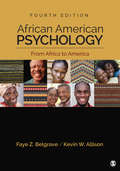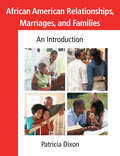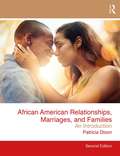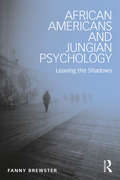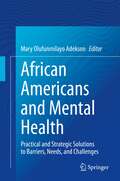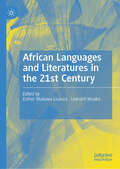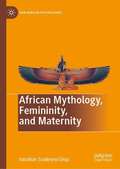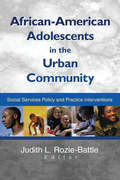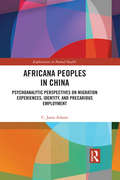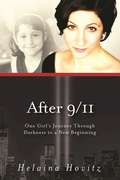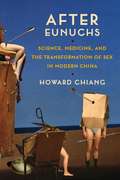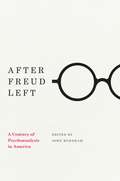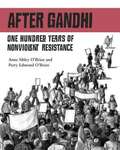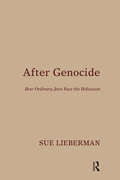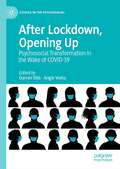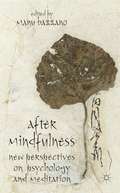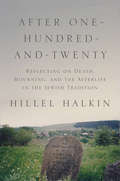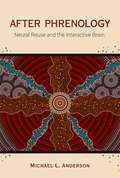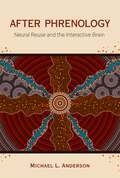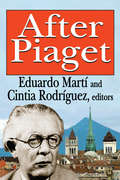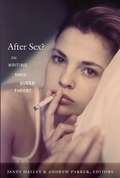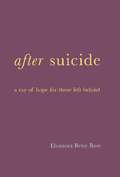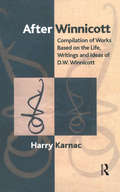- Table View
- List View
African American Psychology: From Africa to America
by Faye Z. Belgrave Kevin W. AllisonAfrican American Psychology: From Africa to America, Fourth Edition provides comprehensive coverage of the field of African American psychology. Authors Faye Z. Belgrave and Kevin W. Allison skillfully convey the integration of African and American influences on the psychology of African Americans using a consistent theme throughout the text—the idea that understanding the psychology of African Americans is closely linked to understanding what is happening in the institutional systems in the United States. The Fourth Edition reflects notable advances and important developments in the field over the last several years, and includes evidence-based practices for improving the overall well-being of African American communities. New to the Fourth Edition Coverage of current issues affecting African Americans and causing changes in the social-political environment include the Black Lives Matter movement, racial trauma, and more. Content from blogs has been added to chapter-opening cover stories to reflect the more modern ways news and information are obtained. More coverage of literature and research on Blacks throughout the diaspora, especially in Africa, provide historical context and documents heterogeneity among African Americans in the United States. Expanded coverage of topics as a result of recent research includes LGBTQ individuals, African American fathers, colorism, intersectionality, electronic cigarettes, social media, and more.
African American Psychology: From Africa to America
by Faye Z. Belgrave Kevin W. AllisonAfrican American Psychology: From Africa to America, Fourth Edition provides comprehensive coverage of the field of African American psychology. Authors Faye Z. Belgrave and Kevin W. Allison skillfully convey the integration of African and American influences on the psychology of African Americans using a consistent theme throughout the text—the idea that understanding the psychology of African Americans is closely linked to understanding what is happening in the institutional systems in the United States. The Fourth Edition reflects notable advances and important developments in the field over the last several years, and includes evidence-based practices for improving the overall well-being of African American communities. New to the Fourth Edition Coverage of current issues affecting African Americans and causing changes in the social-political environment include the Black Lives Matter movement, racial trauma, and more. Content from blogs has been added to chapter-opening cover stories to reflect the more modern ways news and information are obtained. More coverage of literature and research on Blacks throughout the diaspora, especially in Africa, provide historical context and documents heterogeneity among African Americans in the United States. Expanded coverage of topics as a result of recent research includes LGBTQ individuals, African American fathers, colorism, intersectionality, electronic cigarettes, social media, and more.
African American Relationships, Marriages, and Families
by Patricia DixonAfrican American Relationships, Marriages, and Families is a historically and culturally centered text designed for relationship, marriage and family educators and therapists who work with African American singles and couples. Complete with numerous exercises, the book helps singles and couples increase their self-awareness, partner awareness and respect, and appreciation for difference. It also helps foster effective communication and conflict resolution skills, showing readers how to develop and maintain healthy relationships, marriages, and families. No ground is left uncovered in Dixon's thoughtful and considered analysis.
African American Relationships, Marriages, and Families: An Introduction
by Patricia DixonAfrican American Relationships, Marriages, and Families, Second Edition is a historically and culturally centered research-based text designed for use in undergraduate, graduate, and community-based courses on African American relationships, marriages, and families. Complete with numerous exercises, this volume can be used by current and future helping professionals to guide singles and couples by increasing single and partner-awareness, and respect and appreciation for difference. In addition, singles and couples learn skills for effective communication and conflict resolution and ultimately how to develop and maintain healthy relationships, marriages, and families. This second edition includes updates and revisions to current chapters and also features two new chapters: one on parenting and one on same-gender loving/LGBTQ.
African Americans and Jungian Psychology: Leaving the Shadows
by Fanny BrewsterAfrican Americans and Jungian Psychology: Leaving the Shadows explores the little-known racial relationship between the African diaspora and C.G. Jung’s analytical psychology. In this unique book, Fanny Brewster explores the culture of Jungian psychology in America and its often-difficult relationship with race and racism. Beginning with an examination of how Jungian psychology initially failed to engage African Americans, and continuing to the modern use of the Shadow in language and imagery, Brewster creates space for a much broader discussion regarding race and racism in America. Using Jung’s own words, Brewster establishes a timeline of Jungian perspectives on African Americans from the past to the present. She explores the European roots of analytical psychology and its racial biases, as well as the impact this has on contemporary society. The book also expands our understanding of the negative impact of racism in American psychology, beginning a dialogue and proposing how we might change our thinking and behaviors to create a twenty-first-century Jungian psychology that recognizes an American multicultural psyche and a positive African American culture.African Americans and Jungian Psychology: Leaving the Shadows explores the positive contributions of African culture to Jung’s theories and will be essential reading for analytical psychologists, academics and students of Jungian and post-Jungian studies, African American studies, and American studies.
African Americans and Mental Health: Practical and Strategic Solutions to Barriers, Needs, and Challenges
by Mary Olufunmilayo AdeksonThis book enumerates the unique challenges, barriers, needs, and trauma of being an African American in the United States, and at the same time highlights what needs to be done to improve and foster the mental health healing of this population. This includes practical applications and strategic solutions that work, such as the family togetherness and ardent spiritual beliefs that form the basis for resilient and vibrant mental health among African Americans. This contributed volume features the authorship of counseling professionals, most of whom are African American themselves. Because of their own personal experiences, they are able to emphasize cogent helping strategies for this population, to show how to move forward with encouragement. The book also highlights ways to promote life that is mentally healthy and holistic for African Americans.Topics covered within the chapters include:Mental Health Challenges Unique to African American Children and AdolescentsDiagnosis Issues with African Americans Culture of Family Togetherness, Emotional Resilience, and Spiritual Lifestyles Inherent in African Americans from the Time of Slavery Until Now The Trauma of Being an African American in the 21st Century Training, Recruiting, and Retaining African American Mental Health ProfessionalsAfrican Americans and Mental Health: Practical and Strategic Solutions to Barriers, Needs, and Challenges is an essential resource for helping professionals who work with this population, including psychiatrists, counselors, psychologists, social workers, and other mental health professionals. The book also should be of interest to researchers, instructors, and students in Counseling, Social Work, and Psychology.
African Languages and Literatures in the 21st Century
by Esther Mukewa Lisanza Leonard MuakaThis edited book examines the crucial role still played by African languages in pedagogy and literatures in the 21st century, generating insights into how they effectively serve cultural needs across the African continent and beyond. Boldly positioning African languages as key resources in the 21st century, chapters focus on themes such as language revolt by marginalized groups at grassroots level, the experience of American students learning African languages, female empowerment through the use of African languages in music, film and literary works, and immigration issues. The contributions are written by scholars of language, literature, education and linguistics, and the book will be of interest to students and scholars in these and related areas.
African Mythology, Femininity, and Maternity (Pan-African Psychologies)
by Ismahan Soukeyna DiopThis book explores feminine archetypes and mythological figures in African and European traditions with an underlying goal of describing the foundations of social status for women. The author provides a rich corpus of mythology and tales to illustrate aspects of female and mother-daughter relationships. Diop analyzes the symbolic aspects of maternity and femininity, describing the social meaning of the matrix, breasts, and breastfeeding. A retrospective of female characters in African literature brings an interesting approach to explore the figures of femininity and maternity in society. After an extensive analysis of African mythology and tales, the author proposes a way to integrate them in the clinical psychotherapy as a projective material. The analysis of clinical cases offers an example of how this material can be used in therapy with women from African descent.
African-American Adolescents in the Urban Community: Social Services Policy and Practice Interventions
by Judith Rozie-BattleBecome a more effective social worker with this outstanding volume on inner-city urban youth! African-American Adolescents in the Urban Community: Social Services Policy and Practice Interventions examines contemporary issues confronting African-American youth. It highlights key areas such as health, education, the criminal justice system, and youth development strategies. An essential overview of the status of urban African-American youth for students, professionals working with this important population, and policymakers, this vital book proposes policy and programming considerations for today and for the future.African-American Adolescents in the Urban Community is a one-stop view of: ways to help African-American youth experience responsibility and community involvement health concerns of this population, including teen pregnancy, alcohol and drug addiction, and limited access to health care the challenges that lie ahead for African-American girls, including crime, poverty, poor self-esteem, and peer pressure ways to help teenage fathers meet their financial and emotional obligations to their families police and prosecutorial policies that need to be examined and challenged to end the perception of a racially unjust system and much more
Africana People in China: Psychoanalytic Perspectives on Migration Experiences, Identity, and Precarious Employment (Explorations in Mental Health)
by C. Jama AdamsThis book examines the psychosocial experiences of foreign workers from Africa and its diaspora in China, within the context of international socio-economic forces. By exploring employment-based migration from a psychoanalytic perspective, this volume investigates the utility of adaptive ambivalence and the challenges that migrant workers face around issues of self-development, agency, and identity. Through a careful analysis of interviews with Africana people, the author demonstrates that the capacity to be reflective and resilient alongside having a strong and diversified support network are crucial for the psychological well-being of those living and working in unfamiliar geographic and cultural conditions.
After 9/11: One Girl's Journey through Darkness to a New Beginning
by Jasmin Lee Cori Helaina Hovitz“You are a herald for your generation....Thank you for using your voice to help us make sense of that dark day, and forge a new beginning.”—Hillary Rodham Clinton, in a letter to Helaina Hovitz Helaina Hovitz was twelve years old and in middle school just blocks away when the World Trade Center was attacked. Her memoir encapsulates the journey of a girl growing up with PTSD after living through the events firsthand. After 9/11 chronicles its effects on a young girl at the outset of adolescence, following her as she spirals into addiction and rebellion, through loss, chaos, and confusion.The events of 9/11 were a very real part of Helaina’s life and are still vivid in her memory today. Hundreds were stranded in the neighborhood, including Helaina, without phones or electricity or anyone to help. Fear and despair took over her life. It would take Helaina more than a decade to overcome the PTSD — and subsequent alcohol addiction — that went misdiagnosed and mistreated. In many ways, After 9/11 is the story of a generation growing up in the aftermath of America’s darkest day —and for one young woman, it is the story of a survivor who, after witnessing the end, got to make a new beginning. This new trade paperback edition includes tips on how to cope with trauma, an FAQ section, and a guide to discussing 9/11 with children. “Inspirational, courageous and beautifully told. After 9/11 is a testament to the resiliency of the human spirit.” — Cathy Free, correspondent, PEOPLE magazine“Helaina Hovitz's engrossing narrative begins in the shadow of the twin towers with her as a backpack-toting twelve-year-old and plays out over the next fifteen years in dramatic - and sometimes distressing - detail. This impressive debut is both deeply evocative and intensely personal.” — Peter Canby, Senior Editor, The New Yorker“A moving and remarkable testament to a time that changed our country, told beautifully by a young woman who never gave up hope that she could reclaim her life, no matter how grim things looked.” — Sean Elder, contributor, Newsweek
After Effects: A Memoir of Complicated Grief
by Andrea GilatsAn intensely moving and revelatory memoir of enduring and emerging from exceptional grief To grieve after a profound loss is perfectly natural and healthy. To be debilitated by grief for more than a decade, as Andrea Gilats was, is something else. In her candid, deeply moving, and ultimately helpful memoir of breaking free of death&’s relentless grip on her life, Gilats tells her story of living with prolonged, or &“complicated,&” grief and offers insight, hope, and guidance to others who suffer as she did. Thomas Dayton, Andrea Gilats&’s husband of twenty years, died at 52 after a five-month battle with cancer. In After Effects Gilats describes the desolation that followed and the slow and torturous twenty-year journey that brought her back to life. In the two years immediately following his death, Gilats wrote Tom daily letters, desperately trying to maintain the twenty-year conversation of their marriage. Excerpts from these letters reveal the depth of her despair but also the glimmer of an awakening as they also trace a different, more typical course of the grief experienced by one of Gilats's colleagues, also widowed. Gilats&’s struggle to rescue herself takes her through the temptation of suicide, the threat of deadly illness, the overwhelming challenges of work, and the rigor of learning and eventually teaching yoga, to a moment of reckoning and, finally, reconciliation to a life without her beloved partner. Her story is informed by the lessons she learned about complicated grief as a disorder that, while intensely personal, can be defined, grappled with, and overcome.Though complicated grief affects as many as one in seven of those stricken by the loss of a close loved one, it is little known outside professional circles. After Effects points toward a path of recuperation and provides solace along the way—a service and a comfort that is all the more timely and necessary in our pandemic-ravaged world of loss and isolation.
After Eunuchs: Science, Medicine, and the Transformation of Sex in Modern China
by Howard ChiangFor much of Chinese history, the eunuch stood out as an exceptional figure at the margins of gender categories. Amid the disintegration of the Qing Empire, men and women in China began to understand their differences in the language of modern science. In After Eunuchs, Howard Chiang traces the genealogy of sexual knowledge from the demise of eunuchism to the emergence of transsexuality, showing the centrality of new epistemic structures to the formation of Chinese modernity.From anticastration discourses in the late Qing era to sex-reassignment surgeries in Taiwan in the 1950s and queer movements in the 1980s and 1990s, After Eunuchs explores the ways the introduction of Western biomedical sciences transformed normative meanings of gender, sexuality, and the body in China. Chiang investigates how competing definitions of sex circulated in science, medicine, vernacular culture, and the periodical press, bringing to light a rich and vibrant discourse of sex change in the first half of the twentieth century. He focuses on the stories of gender and sexual minorities as well as a large supporting cast of doctors, scientists, philosophers, educators, reformers, journalists, and tabloid writers, as they debated the questions of political sovereignty, national belonging, cultural authenticity, scientific modernity, human difference, and the power and authority of truths about sex. Theoretically sophisticated and far-reaching, After Eunuchs is an innovative contribution to the history and philosophy of science and queer and Sinophone studies.
After Freud Left: A Century of Psychoanalysis in America
by John BurnhamFrom August 29 to September 21, 1909, Sigmund Freud visited the United States, where he gave five lectures at Clark University in Worcester, Massachusetts. This volume brings together a stunning gallery of leading historians of psychoanalysis and of American culture to consider the broad history of psychoanalysis in America and to reflect on what has happened to Freud’s legacy in the United States in the century since his visit There has been a flood of recent scholarship on Freud’s life and on the European and world history of psychoanalysis, but historians have produced relatively little on the proliferation of psychoanalytic thinking in the United States, where Freud’s work had monumental intellectual and social impact. The essays in After Freud Left provide readers with insights and perspectives to help them understand the uniqueness of Americans’ psychoanalytic thinking, as well as the forms in which the legacy of Freud remains active in the United States in the twenty-first century. After Freud Left will be essential reading for anyone interested in twentieth-century American history, general intellectual and cultural history, and psychology and psychiatry.
After Gandhi: One Hundred Years of Nonviolent Resistance
by Anne Sibley O'Brien Perry Edmond O'BrienThis book explores the work of Mohandas Gandhi and his legacy through fifteen profiles of activists who chose nonviolent resistance as the path to change. The book focuses on heroic individuals who were in direct physical danger and chose to respond with nonviolence.
After Genocide: How Ordinary Jews Face the Holocaust
by Sue Lieberman2015 was the seventieth anniversary of the end of World War Two, and, for Jews, the seventieth anniversary of the end of the worst Jewish catastrophe in diaspora history. After Genocide considers how, more than two generations since the war, the events of the Holocaust continue to haunt Jewish people and the worldwide Jewish population, even where there was no immediate family connection. Drawing from interviews with "ordinary" Jews from across the age spectrum, After Genocide focuses on the complex psychological legacy of the Holocaust. Is it, as many think, a "collective trauma"? How is a community detached in space and time traumatised by an event which neither they nor their immediate ancestors experienced?"Ordinary" Jews' own words bring to life a narrative which looks at how commonly-recognised attributes of trauma - loss, anger, fear, guilt, shame - are integral to Jewish reactions to the Holocaust.
After Lockdown, Opening Up: Psychosocial Transformation in the Wake of COVID-19 (Studies in the Psychosocial)
by Darren Ellis Angie VoelaThis edited volume examines the psychosocial transformations experienced during the COVID-19 pandemic and lockdown, and envisions those that might lead to a more equitable society as we ‘open up’. The book integrates psychoanalysis, sociology, cultural studies, and psychology to address three main areas: personal experiences of the lockdown, new formations of power and desire that the lockdown has shaped, and global concerns related to the pandemic. Within those three areas, the chapters discuss key themes that include the uses of space during lockdown; experiences of death, loss, and domestic violence; race and the pandemic; technology, media, and viral media; chronic illness; handwashing and COVID-19; and conspiracy theories.Drawing together academics and practitioners with a common vision of social justice and active pedagogy, the contents of this volume combine experiential writing with cutting-edge, theoretically-informed interdisciplinary debates. The book advances and demonstrates the productive diversity of psychosocial studies, drawing on psychoanalytic theories, critical psychologies, critical theories, critical race theories, process philosophies, affect theories, and critical pedagogy. In doing so, it will appeal to scholars across the social sciences.
After Mindfulness
by Manu BazzanoThe Mindfulness phenomenon has swept the mental health field over the last two decades, helping to bring some of Buddhism's more inaccessible doctrines to a broader audience. While it would be naive to think that our instinctive human longing for the sacred can be satisfied by a diet of weekly exercises, cognitive rewiring and behavioural reprogramming, it would be equally naive to depend on 'trans-personal' and 'spiritual' guides to provide us with a pocket-sized map of our own path. Instead, we each create a path as we walk. After Mindfulness brings together well-known Buddhist writers and renowned therapists and theorists from various orientations for an appreciation and critical evaluation of Mindfulness. This unprecedented collection of expertise, ranging from clinical work to inspired commentaries on the Buddha's teachings, will greatly inspire anyone who is interested in the creative integration of psychology and meditation. "
After One-Hundred-and-Twenty: Reflecting on Death, Mourning, and the Afterlife in the Jewish Tradition
by Hillel HalkinAfter One-Hundred-and-Twenty provides a richly nuanced and deeply personal look at Jewish attitudes and practices regarding death, mourning, and the afterlife as they have existed and evolved from biblical times to today. Taking its title from the Hebrew and Yiddish blessing to live to a ripe old age--Moses is said to have been 120 years old when he died--the book explores how the Bible's original reticence about an afterlife gave way to views about personal judgment and reward after death, the resurrection of the body, and even reincarnation. It examines Talmudic perspectives on grief, burial, and the afterlife, shows how Jewish approaches to death changed in the Middle Ages with thinkers like Maimonides and in the mystical writings of the Zohar, and delves into such things as the origins of the custom of reciting Kaddish for the deceased and beliefs about encountering the dead in visions and dreams.After One-Hundred-and-Twenty is also Hillel Halkin's eloquent and disarmingly candid reflection on his own mortality, the deaths of those he has known and loved, and the comfort he has and has not derived from Jewish tradition.
After Phrenology
by Michael L. AndersonThe computer analogy of the mind has been as widely adopted in contemporary cognitive neuroscience as was the analogy of the brain as a collection of organs in phrenology. Just as the phrenologist would insist that each organ must have its particular function, so contemporary cognitive neuroscience is committed to the notion that each brain region must have its fundamental computation. In After Phrenology, Michael Anderson argues that to achieve a fully post-phrenological science of the brain, we need to reassess this commitment and devise an alternate, neuroscientifically grounded taxonomy of mental function. Anderson contends that the cognitive roles played by each region of the brain are highly various, reflecting different neural partnerships established under different circumstances. He proposes quantifying the functional properties of neural assemblies in terms of their dispositional tendencies rather than their computational or information-processing operations. Exploring larger-scale issues, and drawing on evidence from embodied cognition, Anderson develops a picture of thinking rooted in the exploitation and extension of our early-evolving capacity for iterated interaction with the world. He argues that the multidimensional approach to the brain he describes offers a much better fit for these findings, and a more promising road toward a unified science of minded organisms.
After Phrenology: Neural Reuse and the Interactive Brain
by Michael L. AndersonA proposal for a fully post-phrenological neuroscience that details the evolutionary roots of functional diversity in brain regions and networks.The computer analogy of the mind has been as widely adopted in contemporary cognitive neuroscience as was the analogy of the brain as a collection of organs in phrenology. Just as the phrenologist would insist that each organ must have its particular function, so contemporary cognitive neuroscience is committed to the notion that each brain region must have its fundamental computation. In After Phrenology, Michael Anderson argues that to achieve a fully post-phrenological science of the brain, we need to reassess this commitment and devise an alternate, neuroscientifically grounded taxonomy of mental function. Anderson contends that the cognitive roles played by each region of the brain are highly various, reflecting different neural partnerships established under different circumstances. He proposes quantifying the functional properties of neural assemblies in terms of their dispositional tendencies rather than their computational or information-processing operations. Exploring larger-scale issues, and drawing on evidence from embodied cognition, Anderson develops a picture of thinking rooted in the exploitation and extension of our early-evolving capacity for iterated interaction with the world. He argues that the multidimensional approach to the brain he describes offers a much better fit for these findings, and a more promising road toward a unified science of minded organisms.
After Piaget
by Eduardo MartiAfter Piaget proves that Jean Piaget's work is critical for understanding some of the most current proposals in the study of psychological development. It analyzes Piaget's legacy, moving beyond the harsh critiques that have circulated since he lost prominence. It also brings together new developments and research practices that have grown out of Jean Piaget's tradition, while providing a retrospective glance into the intellectual atmospheres of different periods at which the contributors encountered Piaget.This book reveals the richness and coherence of the School of Geneva's research during the last decades before Piaget's death. Contributions from scholars who formed part of the School of Geneva during the 1970s and '80s demonstrate Piaget's influence on such diverse fields as infant development, ethnology, neuropsychology, semiotic development, and epistemology. After Piaget is part of Transaction's History and Theory of Psychology series.
After Sex?: On Writing Since Queer Theory
by Janet Halley Andrew ParkerSince queer theory originated in the early 1990s, its insights and modes of analysis have been taken up by scholars across the humanities and social sciences. In After Sex? prominent contributors to the development of queer studies offer personal reflections on the field's history, accomplishments, potential, and limitations. They consider the purpose of queer theory and the extent to which it is or is not defined by its engagement with sex and sexuality. For many of the contributors, a broad notion of sexuality is essential to queer thought. At the same time, some of them caution against creating an all-embracing idea of queerness, because it empties the term "queer" of meaning and assumes the universality of ideas developed in the North American academy. Some essays recall the political urgency of the late 1980s and early 1990s, when gay and lesbian activist and queer theory projects converged in response to the AIDS crisis. Other pieces exemplify more recent trends in queer critique, including the turn to affect and the debates surrounding the "antisocial thesis," which associates queerness with the repudiation of heteronormative forms of belonging. Contributors discuss queer theory's engagement with questions of transnationality and globalization, temporality and historical periodization. Meditating on the past and present of queer studies, After Sex? illuminates its future. Contributors. Lauren Berlant, Leo Bersani, Michael Cobb, Ann Cvetkovich, Lee Edelman, Richard Thompson Ford, Carla Freccero, Elizabeth Freeman, Jonathan Goldberg, Janet Halley, Neville Hoad, Joseph Litvak, Heather Love, Michael Lucey, Michael Moon, Jos Esteban Muoz, Jeff Nunokawa, Andrew Parker, Elizabeth A. Povinelli, Richard Rambuss, Erica Rand, Bethany Schneider, Eve Kosofsky Sedgwick, Kate Thomas
After Suicide: A Ray of Hope for Those Left Behind
by Eleanora Betsy RossAn extraordinary book that is a must for all people who have suffered or those who wish to support and counsel the bereaved. -Ari Kiev, M. D. , J. D. , author of A Strategy for Daily Living
After Winnicott: Compilation of Works Based on the Life, Writings and Ideas of D.W. Winnicott
by Harry KarnacThis bibliography is based on the plethora of ideas introduced into the psychoanalytic lexicon by Donald Woods Winnicott. It demonstrates amply how wide the range is of Winnicott scholarship and facilitates post-Freudian Bion and Winnicott studies.
